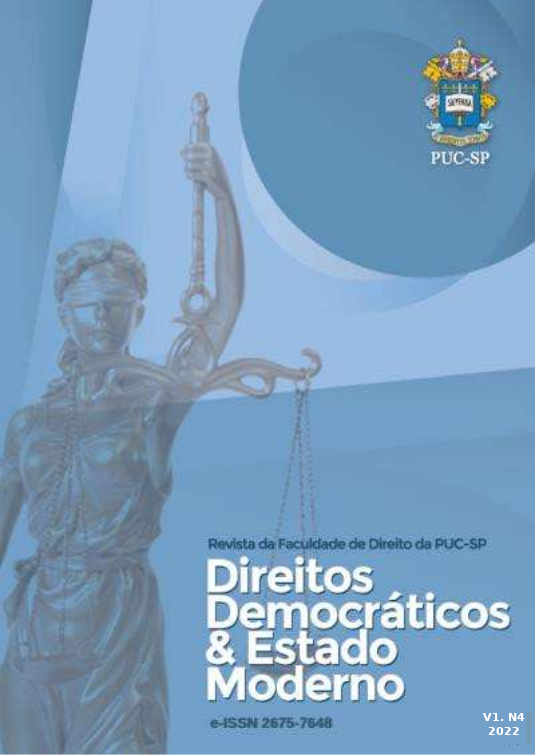Due constitutional and conventional legal process:
necessary dialogue for the democratic rule of law
DOI:
https://doi.org/10.23925/ddem.v.1.n.4.57468Keywords:
Democratic state, Due Legal Process, Constitutionality Control, Conventionality Control, Judicial powerAbstract
The effectiveness of a process due to the restrictive actions of the States is one of the great themes under discussion nowadays. However, in Latin America and, especially in Brazil, there is resistance to the due effectiveness of these guarantees. The weakest democracies have a conservative authoritarian tradition that insists on evading constitutional guarantees recognized on the international stage. Conventional due process in support of the constitutional is a necessary alternative for the paradigm shift in Brazil and in Latin America as a whole. Through the inductive analytical method, this tool was used to observe and analyze its application in the socio-historical and cultural context of the Western world, mainly, aiming at the constitutional observation of fundamental and human rights in Brazil as a paradigm.
References
ARCARO CONCI, Luiz Guilherme. Mercorur, Integration Regional Y Derechos Humanos en un Proceso Multinivel, Estudios constitucionales [online]. 2015, vol.13, n.2, pp.125-152. ISSN 0718-5200. http://dx.doi.org/10.4067/S0718-52002015000200005.
BERTOLINO, Pedro. El Debido Processo Penal. Editora La Plata. 1986.
CANOTILHO, JJ Gomes. Direito Constitucional e Teoria da Constituição. Almedina .2018. Lisboa, página 123.
FERRAJOLI, Luigi. Direito e Razão Teoria do Garantismo Penal. São Paulo: Editora Revista dos Tribunais, 2002.
FERRAJOLI, Luigi. Garantismo :uma discussão sobre direito e democracia. Editora Lumen Juris, 2012.
GARCEZ RAMOS, João Gualberto. Evolução Histórica do Princípio do Devido Processo Legal, In Revista da UFPR, Curitiba, 2007.
GIACOMOLLI, Nereu José. O devido Processo Legal. Editora Atlas. São Paulo. 2014.
GLOECKNER, Ricardo Jacobsen. Autoritarismo e processo penal: Uma genealogia das ideias autoritárias no processo penal brasileiro. Editora Tirant Lo Blanch, 2018.
LLOBET RODRIGUEZ, Javier. La Corte Interamericana de Derechos Humanos y las garantias Penales, Editora Ulpiano, 2019.
LOPES JR, Auri. Fundamentos do Processo Penal - Introdução crítica, Saraiva Jur. 2019.
MAZZUOLI, Valério de Oliveira. O controle jurisdicional da convencionalidade das leis. Revista dos Tribunais; São Paulo, 2011.
MORIN, Edgar. Ensinando a Transgredir – A educação como prática da liberdade. Editora bell Hooks. 2008.
PARLAMENTO EUROPEU. DIRETIIVA (UE) 2016/343 do Parlamento Europeu e do Conselho – 09 de março de 2016 – relativa ao reforço de certos aspectos da presunção de inocência e do direito de comparecer em julgamento em processo penal (europa.eu). Acesso em 21/04/2021.
PROCESSO ELETRÔNICO: MS 31667 AgR, Relator: Dias Tóffoli, Segunda Turma, julgado em 11/09/2018, processo eletrônico DJE-250 DIVULG 22-11-2018 PUBLIC 23-11-2018.
PROCESSO ELETRÔNICO: STJ. AgRg no AREsp 1373849/PR, Rel. Ministro Joel Ilan Paciornik, Quinta Turma, julgado em 19/11/2019, DJe 28/11/2019, disponível em https://scon.stj.br/SCON/GetInteiroTeorDoAcordao?num registro=201802579429&dt publicação=28/11/2019. Acesso 31/01/2021.;
ROSSI, Jorge Vasquez. El debido Processo em la Jurisprudencia de la Corte Intaremericana de Derechos Humanos, 2017
SILVA, Marco Antonio Marques da. Acesso à justiça penal e Estado Democrático de Direito. Editora Juarez de Oliveira, 2001.
STRECK, Lenio. Dicionário de Hermenêutica. Editora Casa do Direito. Belo Horizonte. 2018.
Downloads
Published
How to Cite
Issue
Section
License
Copyright (c) 2022 Democratic Rights & Modern State

This work is licensed under a Creative Commons Attribution 4.0 International License.
This work is licensed under a License Creative Commons Atribuição 4.0 Internacional.
The authors grant the journal all copyrights relating to the published works. The concepts issued in signed articles are the absolute and exclusive responsibility of their authors.
DD&EM Magazine - ISSN 2675-7648

















